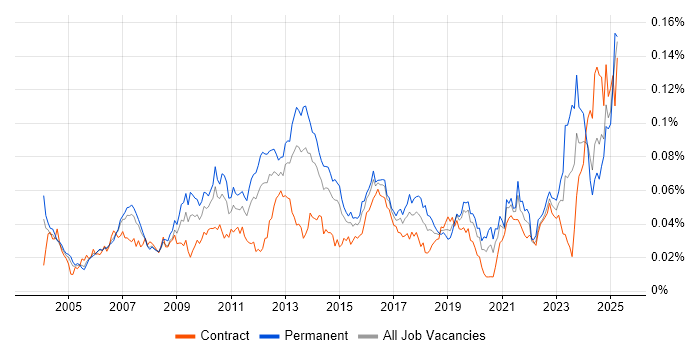Database Optimisation
UK > England
The table below provides summary statistics for contract job vacancies advertised in England requiring Database Optimisation skills. It includes a benchmarking guide to the contractor rates offered in vacancies that cited Database Optimisation over the 6 months leading up to 1 May 2025, comparing them to the same period in the previous two years.
| 6 months to 1 May 2025 |
Same period 2024 | Same period 2023 | |
|---|---|---|---|
| Rank | 449 | 503 | 629 |
| Rank change year-on-year | +54 | +126 | +133 |
| Contract jobs citing Database Optimisation | 36 | 39 | 24 |
| As % of all contract jobs advertised in England | 0.15% | 0.10% | 0.048% |
| As % of the Processes & Methodologies category | 0.16% | 0.12% | 0.053% |
| Number of daily rates quoted | 25 | 31 | 23 |
| 10th Percentile | £410 | £418 | £317 |
| 25th Percentile | £513 | £483 | £500 |
| Median daily rate (50th Percentile) | £575 | £545 | £590 |
| Median % change year-on-year | +5.50% | -7.63% | +2.61% |
| 75th Percentile | £638 | £674 | £605 |
| 90th Percentile | £645 | £700 | £610 |
| UK median daily rate | £563 | £520 | £590 |
| % change year-on-year | +8.17% | -11.86% | +2.61% |
| Number of hourly rates quoted | 1 | 0 | 0 |
| 10th Percentile | - | - | - |
| 25th Percentile | £61.87 | - | - |
| Median hourly rate | £63.75 | - | - |
| 75th Percentile | £65.62 | - | - |
| 90th Percentile | - | - | - |
| UK median hourly rate | £63.75 | - | - |
All Process and Methodology Skills
England
Database Optimisation falls under the Processes and Methodologies category. For comparison with the information above, the following table provides summary statistics for all contract job vacancies requiring process or methodology skills in England.
| Contract vacancies with a requirement for process or methodology skills | 22,202 | 32,193 | 45,529 |
| As % of all contract IT jobs advertised in England | 91.16% | 86.56% | 90.24% |
| Number of daily rates quoted | 14,534 | 21,105 | 31,969 |
| 10th Percentile | £310 | £300 | £325 |
| 25th Percentile | £413 | £413 | £445 |
| Median daily rate (50th Percentile) | £525 | £525 | £550 |
| Median % change year-on-year | - | -4.55% | +2.33% |
| 75th Percentile | £638 | £650 | £675 |
| 90th Percentile | £750 | £750 | £765 |
| UK median daily rate | £520 | £525 | £550 |
| % change year-on-year | -0.95% | -4.55% | +4.76% |
| Number of hourly rates quoted | 921 | 2,246 | 1,592 |
| 10th Percentile | £14.42 | £12.92 | £10.87 |
| 25th Percentile | £18.20 | £16.01 | £16.25 |
| Median hourly rate | £29.07 | £36.00 | £37.50 |
| Median % change year-on-year | -19.25% | -4.00% | +53.06% |
| 75th Percentile | £63.75 | £60.00 | £65.00 |
| 90th Percentile | £75.00 | £72.50 | £75.00 |
| UK median hourly rate | £29.00 | £35.65 | £37.30 |
| % change year-on-year | -18.65% | -4.42% | +49.20% |
Database Optimisation
Job Vacancy Trend in England
Job postings citing Database Optimisation as a proportion of all IT jobs advertised in England.

Database Optimisation
Contractor Daily Rate Trend in England
3-month moving average daily rate quoted in jobs citing Database Optimisation in England.
Database Optimisation
Daily Rate Histogram in England
Daily rate distribution for jobs citing Database Optimisation in England over the 6 months to 1 May 2025.
Database Optimisation
Contractor Hourly Rate Trend in England
3-month moving average hourly rates quoted in jobs citing Database Optimisation in England.
Database Optimisation
Contract Job Locations in England
The table below looks at the demand and provides a guide to the median contractor rates quoted in IT jobs citing Database Optimisation within the England region over the 6 months to 1 May 2025. The 'Rank Change' column provides an indication of the change in demand within each location based on the same 6 month period last year.
| Location | Rank Change on Same Period Last Year |
Matching Contract IT Job Ads |
Median Daily Rate Past 6 Months |
Median Daily Rate % Change on Same Period Last Year |
Live Jobs |
|---|---|---|---|---|---|
| London | +41 | 31 | £575 | +9.52% | 19 |
| North West | +19 | 4 | £625 | +8.70% | 11 |
| North of England | +18 | 4 | £625 | +29.53% | 20 |
| South West | +43 | 3 | £625 | -5.30% | 12 |
| West Midlands | - | 1 | - | - | 8 |
| South East | - | 1 | - | - | 23 |
| Midlands | - | 1 | - | - | 17 |
| Database Optimisation UK |
|||||
Database Optimisation
Co-occurring Skills and Capabilities in England by Category
The follow tables expand on the table above by listing co-occurrences grouped by category. The same employment type, locality and period is covered with up to 20 co-occurrences shown in each of the following categories:
|
|
||||||||||||||||||||||||||||||||||||||||||||||||||||||||||||||||||||||||||||||||||||||||||||||||||||||||||||||||||||||||
|
|
||||||||||||||||||||||||||||||||||||||||||||||||||||||||||||||||||||||||||||||||||||||||||||||||||||||||||||||||||||||||
|
|
||||||||||||||||||||||||||||||||||||||||||||||||||||||||||||||||||||||||||||||||||||||||||||||||||||||||||||||||||||||||
|
|
||||||||||||||||||||||||||||||||||||||||||||||||||||||||||||||||||||||||||||||||||||||||||||||||||||||||||||||||||||||||
|
|
||||||||||||||||||||||||||||||||||||||||||||||||||||||||||||||||||||||||||||||||||||||||||||||||||||||||||||||||||||||||
|
|
||||||||||||||||||||||||||||||||||||||||||||||||||||||||||||||||||||||||||||||||||||||||||||||||||||||||||||||||||||||||
|
|
||||||||||||||||||||||||||||||||||||||||||||||||||||||||||||||||||||||||||||||||||||||||||||||||||||||||||||||||||||||||
|
|
||||||||||||||||||||||||||||||||||||||||||||||||||||||||||||||||||||||||||||||||||||||||||||||||||||||||||||||||||||||||
